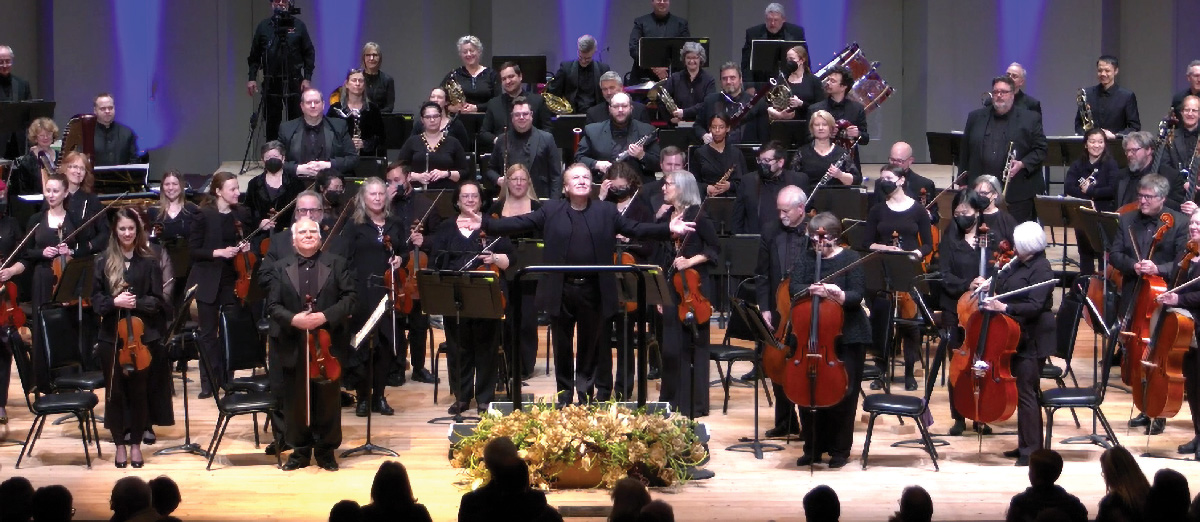“Ode to Joy” Brings FSO and Flint Symphony Chorus Together for Season Finale
 It’s been said music is the most potent form of magic. Maestro Enrique Diemecke and the FIM Flint Symphony Orchestra know all about this. The final concert of the season on May 20 is a perfect example, representing the season’s Romantic Heroes theme through music from Beethoven and Rachmaninoff. The concert also continues a long-standing tradition of the FSO finale concert with the Flint Symphony Chorus.
It’s been said music is the most potent form of magic. Maestro Enrique Diemecke and the FIM Flint Symphony Orchestra know all about this. The final concert of the season on May 20 is a perfect example, representing the season’s Romantic Heroes theme through music from Beethoven and Rachmaninoff. The concert also continues a long-standing tradition of the FSO finale concert with the Flint Symphony Chorus.
“There is always something important in the season’s closing concert,” says Maestro Diemecke. “We will come together to celebrate a magical moment full of beautiful music that wouldn’t happen without the support of our patrons.”
That magic consists of a bold program, including Rachmaninoff’s “Vocalise” from Fourteen Songs, op. 34, no. 14. Diemecke says the music of the night will feature three Flint soloists: soprano Jhane Perdue; mezzo soprano Tiffany Thorpe and bass Frank Pitts. Tenor Roderick Dixon, a Michigan-native, is also performing.
“It’s a piece written for a high voice only, singing on a syllable, showcasing the human voice’s dynamic and expressive quality.”
The opposite of that musical connection may be found in the second part of the evening’s program, Beethoven’s Symphony #9, op.125, D minor. It’s regarded by many critics as one of the supreme achievements in the history of music. It is also the first symphony to incorporate vocal soloists and chorus into what, until then, had been a purely instrumental genre. Words are sung in the final movement, “Ode to Joy.”
Joining the FSO to perform this incredible piece of music will be the Flint Symphony Chorus. It’s a tradition for the chorus to join the symphony in the final performance of the season.
The Flint Symphony Chorus first formed as the Flint Choral Union. It was founded by J. Dallas Dort in 1913 to “unite all persons of the city into a musical union for the benefit of all people in the city.” More than 100 years later, that tradition continues.
Flint Symphony Chorus Co-Director Jeffrey Walker says he looks forward to the partnership every year.
“It’s a privilege to partner with FSO, especially when we will perform one of the greatest pieces of music ever written!”
Nada Radakovich is also the co-director of the Flint Symphony Chorus.
“I’m thrilled to be a part of the long history of the chorus. When I was a little girl, my mom sang in the chorus. Oh my gosh, I get emotional just talking about the partnership and, of course, what we will be performing – Beethoven #9.”
Radakovich says the Flint Symphony Chorus has always felt it is important to join with FSO because the primary thrust of the group is to support orchestra.
Walker agrees and says Beethoven #9 is in tune with that theme of coming together.
“‘Ode to Joy’ represents that all men are brothers. And, frankly, that kind of a text becomes more and more significant and important every day.”
“It’s an incredible piece of music,” says Radakovich. “The baritone starts out, and it’s like a trumpet call. Everybody listens, and then the chorus comes in little by little, gradually building, and becomes enormous! And the audience jumps to their feet. Oh, it’s an experience! It’s so inspiring!”
For those who don’t recognize it, the notes of “Ode to Joy” are on the railing of the Kearsley Street Bridge over I-475 to welcome people to the Flint Cultural Center campus.
Maestro Diemecke says it’s the magical moment of a magical season.
“Long live classical music, and long live the Flint Symphony Orchestra!”
The show’s Guest Artist Sponsor is the Nartel Family Foundation.